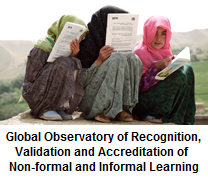
RVA themes
RVA themes and activities relate to the review and analysis of the implementation of RVA policy and practice in Member States
Policy and legislation is a distinctive feature of RVA in some countries, through which national authorities and concerned stakeholders establish measures to validate learning outcomes and build bridges between formal, non-formal and informal learning in the education system and working life.
UIL supports and reviews the development of RVA systems in Member States that are accessible to all, and that promote alternative transitions to further learning and into the world of work for marginalized youth and young adults from an array of socio-economic and ethnic backgrounds and, particularly now, from among the Syrian refugees.
There is growing demand from Member States to learn about policy and practice in RVA in the context of changing skills, competences and training needs in the workplace, across formal and informal sectors, and in education and society.
The use of explicit outcome-based standards in NQFs helps to accommodate non-formal and informal learning. At the same time, through the use of RVA mechanisms, NQFs broaden qualifications to a wider group of users from the domains of work, adult education and the voluntary sector. UIL analyses good practice on this theme using various platforms such as the Global Inventory of National and Regional Qualifications Frameworks, biennial conferences, research articles and workshops.
One of the potential issues of interest for Member States is the transparency of quality-assurance processes, which are important if non-formal and informal learning are to be on par with formal learning. To ensure consistency and acceptance of RVA among all stakeholders, there needs to be a common understanding of the characteristics and practices of quality in RVA programmes and services.
